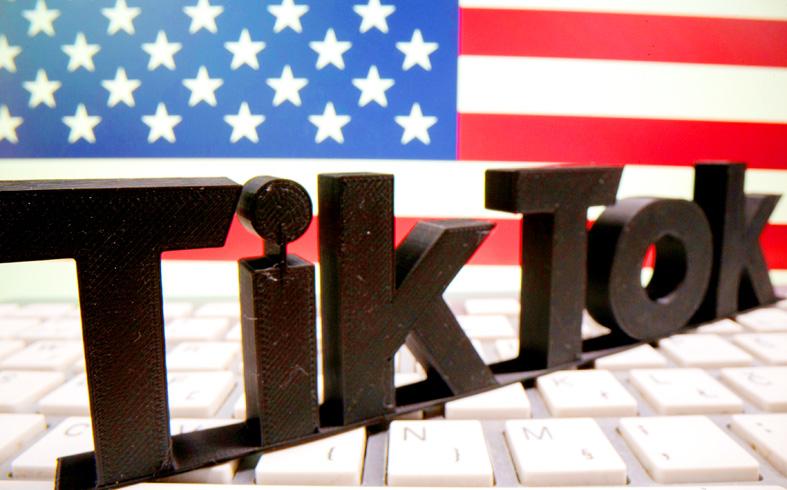The US Department of the Treasury on Wednesday said it had extended by seven days the deadline given to the Chinese owner of TikTok to sell the popular social media platform’s US business.
“The Committee on Foreign Investment in the United States has granted ByteDance [字節跳動] a one-week extension, from November 27, 2020, to December 4, 2020, to allow time to review a revised submission that the committee recently received,” a department spokesperson said.
US President Donald Trump’s administration has expressed national security concerns over the app, claiming it could be used for Chinese espionage and threatening to ban it.

Photo: Reuters
The ban has been challenged in courts, including a case in Washington and a separate filing by the app’s “creators” in a Pennsylvania court, which blocked the ban on Oct. 30, although the government is appealing that order.
Trump, who lost his bid for re-election this month, has claimed that TikTok — which has about 100 million US users — can be used to collect data on Americans for Chinese espionage, a claim denied by the company.
The White House has said TikTok must become a US firm controlled by US investors to avert a ban. However, any plan would likely need approval from Beijing, which has balked at giving up control of its social media star.
The Chinese Ministry of Commerce published new rules in August that added “civilian use” to a list of the types of technology that are restricted for export, which could make it more difficult for ByteDance to sell TikTok, which features clips of everything from dance routines to politics.
A deal appeared to take shape earlier this year, which would allow Silicon Valley giant Oracle Corp to be the data partner for a newly incorporated TikTok Global, with Walmart joining as a commercial partner.
While Trump signaled his approval for the plan, it has not been finalized and the prospects remain unclear.
The developments come amid heightened tensions between Washington and Beijing over trade and national security, with the US administration having also banned Chinese tech giant Huawei Technologies Co (華為) from obtaining US technology and from deals involving wireless networks.

Among the rows of vibrators, rubber torsos and leather harnesses at a Chinese sex toys exhibition in Shanghai this weekend, the beginnings of an artificial intelligence (AI)-driven shift in the industry quietly pulsed. China manufactures about 70 percent of the world’s sex toys, most of it the “hardware” on display at the fair — whether that be technicolor tentacled dildos or hyper-realistic personalized silicone dolls. Yet smart toys have been rising in popularity for some time. Many major European and US brands already offer tech-enhanced products that can enable long-distance love, monitor well-being and even bring people one step closer to

Malaysia’s leader yesterday announced plans to build a massive semiconductor design park, aiming to boost the Southeast Asian nation’s role in the global chip industry. A prominent player in the semiconductor industry for decades, Malaysia accounts for an estimated 13 percent of global back-end manufacturing, according to German tech giant Bosch. Now it wants to go beyond production and emerge as a chip design powerhouse too, Malaysian Prime Minister Anwar Ibrahim said. “I am pleased to announce the largest IC (integrated circuit) Design Park in Southeast Asia, that will house world-class anchor tenants and collaborate with global companies such as Arm [Holdings PLC],”

Sales in the retail, and food and beverage sectors last month continued to rise, increasing 0.7 percent and 13.6 percent respectively from a year earlier, setting record highs for the month of March, the Ministry of Economic Affairs said yesterday. Sales in the wholesale sector also grew last month by 4.6 annually, mainly due to the business opportunities for emerging applications related to artificial intelligence (AI) and high-performance computing technologies, the ministry said in a report. The ministry forecast that retail, and food and beverage sales this month would retain their growth momentum as the former would benefit from Tomb Sweeping Day

TRANSFORMATION: Taiwan is now home to the largest Google hardware research and development center outside of the US, thanks to the nation’s economic policies President Tsai Ing-wen (蔡英文) yesterday attended an event marking the opening of Google’s second hardware research and development (R&D) office in Taiwan, which was held at New Taipei City’s Banciao District (板橋). This signals Taiwan’s transformation into the world’s largest Google hardware research and development center outside of the US, validating the nation’s economic policy in the past eight years, she said. The “five plus two” innovative industries policy, “six core strategic industries” initiative and infrastructure projects have grown the national industry and established resilient supply chains that withstood the COVID-19 pandemic, Tsai said. Taiwan has improved investment conditions of the domestic economy